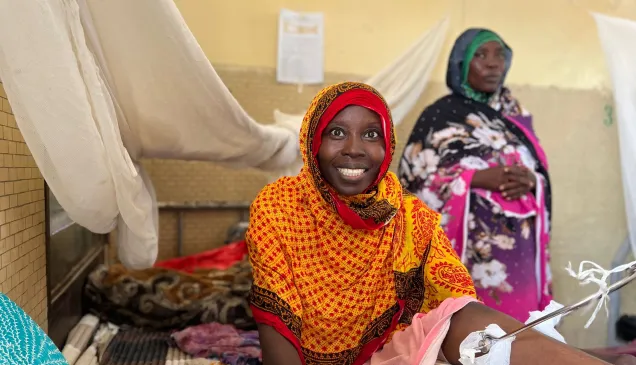A global contract of humanity
Speech given by Mr Peter Maurer, president of the ICRC, United Nations General Assembly, New York, high-level side-event: Uniting around the principle of humanity
I wish to welcome you to this high-level side-event on Uniting around the principle of humanity that I am delighted to co-chair today with the H.E. Sheikh Sabah Khaled Al-Hamad Al-Sabah, First Deputy Prime Minister and Minister of Foreign Affairs of Kuwait.
Today, as we celebrate 50 years of the Fundamental Principles of the Red Cross and Red Crescent Movement and 70 years of the United Nations, I want to urge you all to reaffirm the principle of humanity as a universal principle for States and their citizens, and as a basic guide for all parties in armed conflict.
Failures of humanity in armed conflict
We are meeting at a time when we are collectively grappling to find responses to the enormous suffering caused by the spread of conflict and violence we have witnessed over recent years. The spiral of horror appears to be spinning faster and faster with no end to this trend in sight. As President of the ICRC, I see the consequences of this failing of humanity first hand. It is a failing that burnt itself most emblematically into our collective consciousness with the distressing image of the small boy Aylan Kurdi swept on the shores of the Mediterranean and made us pause and ask ourselves: where is humanity?
I have many conversations with people who lament the apparent weakness of international norms and escalating levels of violence and brutality. Displacement has reached unprecedented levels since World War II. The cost of armed conflict and violence for war-torn States runs into trillions of dollars. Armed conflict and its consequences destroy development gains made over decades and threaten major reversals to UN development goals.
In many places it seems that humanity - the basic principle of mutual respect between all people - is abandoned. What I see in conflicts around the world is a failure of humanity: indiscriminate attacks; direct targeting of civilians; forced displacement; starvation; rape and sexual violence, summary executions, inhuman and degrading treatment in detention. Extreme violence and inhumane treatment are deliberately choreographed and publicized worldwide.
The power of humanity in action
But there is also a story of hope to tell. When I visit the frontlines of our humanitarian response, I see compassion and human solidarity. I see communities helping one another, assisted by governments and international agencies. I see refugees and host families sharing homes. I see prisoners visited; families reunited; medics caring for people; engineers keeping water flowing; vets vaccinating precious cattle, and the urgent transport of food, seeds and shelter. In every armed conflict, I see people protected, lives saved and livelihoods sustained.
In short, I see humanity in action.
The principle is alive. Our collective responsibility is to tap into its various expressions and elevate it to its proper rank in the international arena.
Humanity as first and universal principle
Humanity is the first and most important principle of the Red Cross and Red Crescent Movement. The other principles help us achieve humanity. It is our goal "to prevent and alleviate human suffering wherever it may be found and to protect life, health and to ensure respect for the human person".
The same concern for the "dignity and worth of the human person" is at the heart of the UN Charter. It is therefore no coincidence that we are sharing this platform with UN leaders in this joint anniversary year for our two organizations. Seventy years on, today's generation must reaffirm humanity as a global principle.
We are also joined today by the Foreign Ministers of Kuwait and Switzerland who will share with us their political commitment to humanity. And since the principle of humanity is also fundamental to the world's great religions, I am glad to welcome our three civil society panelists, who represent Islam, Buddhism and Christianity.
Our guests come from different backgrounds – humanitarian, political and religious – to share their perspectives on the principle of humanity. In humanity we find common cause because the principle is universal and transcends religion, culture and ethnicity.
Humanity as the inspiration of international law
Before turning the floor to our distinguished guests, I would like to draw our attention to an important feature of the principle of humanity, which is that it is at the origin of international humanitarian law and human rights law. "Humane treatment" is a basic rule of humanitarian law and of human rights law requiring respect for human dignity by all parties to a conflict. We are thus speaking of a truly universal principle or common good contained in the universally ratified Geneva Conventions and in the UN Charter – a principle underpinning many rules that must be respected.
A global contract of humanity
I believe the global movement for humanity is greater than the movement for inhumanity. We need to make this clear in a new move to unite around the principle of humanity. Today I ask you to recognize that humanity is a responsibility of States and also a personal responsibility of every citizen of the world.
So I am inviting you to build and subscribe to a new global contract of humanity across societies that binds States, non-state armed groups and individuals. With this contract, the leaders of the world will renew their commitment to uphold humanity in even the most trying of circumstances, as well as in the international relations that influence and determine the outcome of armed conflicts.
In the coming months, we have two important opportunities to do this. First at the International Conference of the Red Cross and Red Crescent Movement in December when States will focus on the "power of humanity". Secondly, at the World Humanitarian Summit next year, where new global commitments will be made to improve humanitarian action.
Each of these gatherings of States and peoples needs to affirm a global contract of humanity that commits States, non-state armed groups and individuals to the following key actions in armed conflict:
- Active respect for international law.
- Concrete support for those protecting and assisting the most vulnerable people
- Assertive accountability for failures of humanity
Agreeing this global contract of humanity is the basis on which we can enlarge humanitarian spaces and create conditions that make life possible and bearable for people in armed conflict.
Thank you all for joining us today to unite around the principle of humanity. Let's shape this new contract of humanity that is desperately needed by millions of people today.


